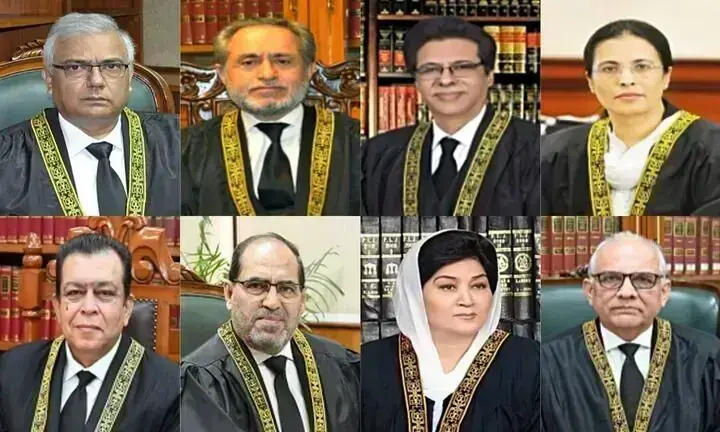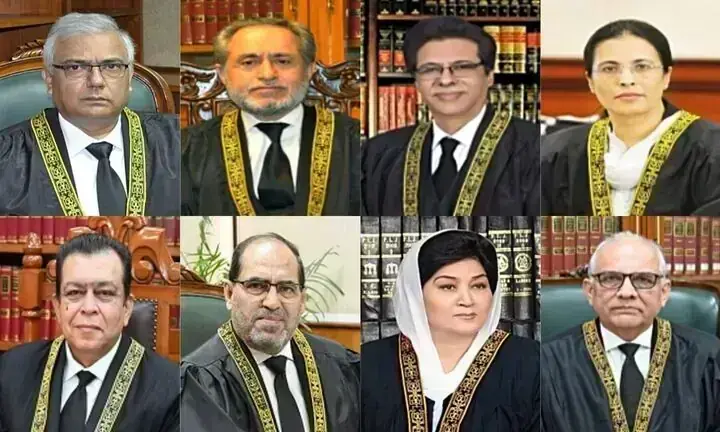
Senior lawyer Abid Shahid Zuberi on Tuesday told the Supreme Court’s (SC) Constitutional Bench (CB) hearing petitions against the 26th Amendment that the chief justice of Pakistan (CJP) had the powers to form a full court.
The 26th Amendment was passed by the parliament during an overnight session in October last year, with the PTI claiming seven of its lawmakers were abducted to gain their favour as the party opposed the legislation. The Balochistan National Party-Mengal (BNP-M) also alleged its two senators were being, with both later defying party line to vote in the tweaks’ favour.
The legislation, which altered judicial authority and tenure, has been a lightning rod for debate with both opposition parties and legal experts questioning its impact on the judiciary’s independence.
The tweaks took away the SC’s suo motu powers, set the CJP’s term at three years and empowered a Special Parliamentary Committee for the appointment of the CJP from among the three most senior SC judges. It also paved the way for the formation of the CB, which is now hearing petitions against the very legislation that enabled its establishment.
The CB hearing the pleas is headed by Justice Aminuddin Khan and also includes Justices Mandokhail, Muhammad Ali Mazhar, Ayesha Malik, Syed Hasan Azhar Rizvi, Musarrat Hilali, Naeem Akhtar Afghan and Shahid Bilal Hassan.
Zuberi, also a former Supreme Court Bar Association (SCBA) president, continued his arguments today. The hearing was adjourned till 11:30am tomorrow.
The live-stream for the hearing began with a delay of about 40 minutes due to internet issues. The Pakistan Telecommunications Limited (PTCL) has said users would experience degraded internet services today as a submarine cable is being repaired.
So far, Zuberi, Lahore High Court Bar Association (LHCBA) lawyer Hamid Khan, Balochistan High Court Bar Association (BHCBA)’s counsel Munir A. Malik, and petitioner Barrister Salahuddin Ahmed have presented their arguments. They have sought the formation of a 16-member full court as per the number of judges present in the SC in Oct 2024, when the Amendment was passed.
Judges have questioned whether the CB has the power to issue orders for the constitution of a full court, as requested by petitioners.
The bench will first determine whether the challenges should be heard by a full court comprising all available SC judges or by the same eight-judge CB, before deciding on the legality of the 26th Amendment.
The case was initially taken up in January, and after the CB’s approval of petitioners’ request for it, the proceedings were being live-streamed on the SC’s YouTube channel since October 8.
The hearing
“There are internet issues today. The live stream will not be possible,” Justice Aminuddin said at the outset of today’s hearing. Justice Mazhar also said the livestream YouTube link was down and asked staff to “check if it could be”.
Zuberi then cited various past court verdicts to support his arguments.
“A party cannot raise an objection on the judge. The judge has the authority [to decide] whether to hear a case or not,” the former SCBA president said.
Upon Zuberi reiterating his request for a “full court”, Justice Mandokhail remarked, “Do not say a full court; say ‘those judges who were present from before the Amendment’.
“On the one hand, you are saying 16 judges and on the other, you also talk about ‘collective knowledge’,” he added.
The petitions
The 26th Amendment had been challenged by various bar associations, bar councils, lawyers, the PTI, and some politicians. The SC is also seized with separate petitions seeking the formation of a full court to hear the matter, rather than the CB.
The petitioners have requested the apex court to strike down the entire 26th Amendment on grounds of procedural impropriety if determined that the requisite two-thirds of the lawfully elected membership of each House did not freely exercise their right to vote in favour of the same as required under Article 239, which elaborates on bills and their passage to amend the Constitution.
In the alternative, the petitioners pleaded, the court should strike down certain provisions of the 26th Amendment since they substantively undermine the independence of the judiciary, which is a salient feature of the Constitution.
These included the provisions for annual performance evaluations of high court judges by the JCP being inserted in Article 175A(1) and Articles 175A(18) to (20); the provisions relating to the appointment of the CJP being the substitution to Article 175A(3), and the provisions for constitutional benches in the SC and high courts.
The petitioners also challenged the constitutionality of the constitutional benches, arguing that the SC should declare invalid all amendments for which votes of such members whose election disputes were pending were necessary to achieve the prescribed numerical threshold in Article 239.
They also called for the Practice and Procedure Act 2024 and the Supreme Court (Number of Judges) Act 2024 to be declared unconstitutional, void ab initio and of no legal effect, since they stem from an “unconstitutional” amendment and represent an attempt to achieve unconstitutional designs.
More to follow

